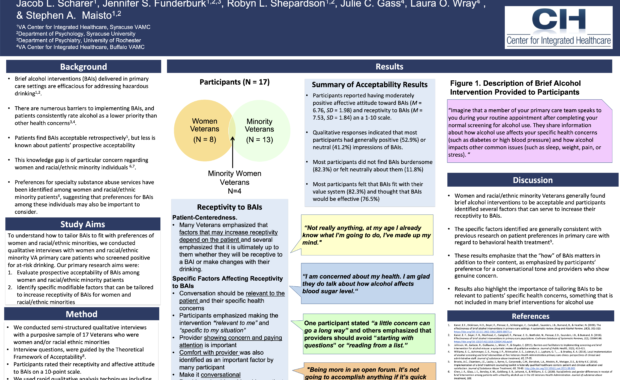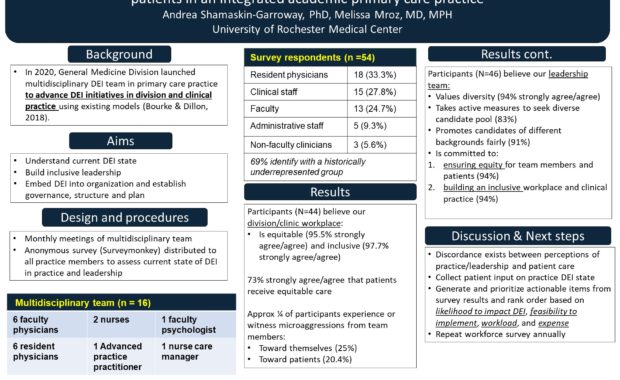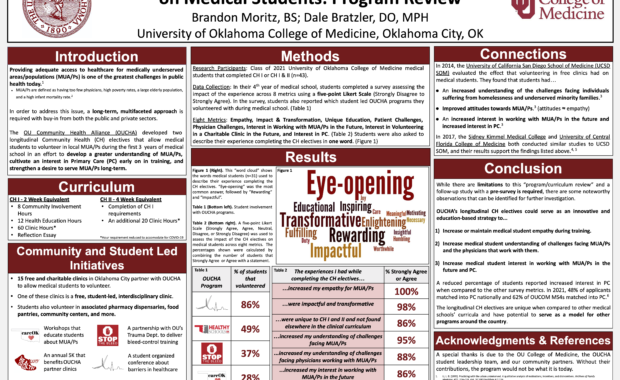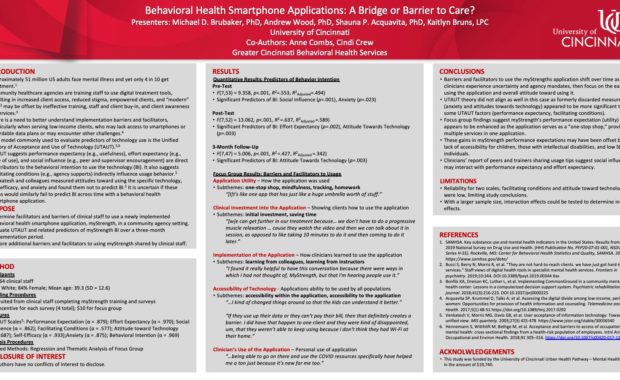This poster presents data on the utilization and perspectives of integrated behavioral health services by medical providers within a women’s
Poster 23 – Lower Extremity Skin Care and Health Among Patients Experiencing Homelessness: Findings from Miami Street Medicine
Abstract: Introduction Unsheltered homeless (USH) individuals' main mode of transportation is by foot and any trauma, injury, or disease affecting the
Poster 41 – Review of Integrated Behavioral Health Services in a Women’s Healthcare Setting
This poster presents data on the utilization and perspectives of integrated behavioral health services by medical providers within a women’s
Poster 23 – Lower Extremity Skin Care and Health Among Patients Experiencing Homelessness: Findings from Miami Street Medicine
Abstract: Introduction Unsheltered homeless (USH) individuals' main mode of transportation is by foot and any trauma, injury, or disease affecting the
J02 – Building Multicultural Awareness and Preparation Towards the Application of Diagnosis and Assessment for Mental Disorders
Mental health disorders are diagnosed at a rate of 1 in every 4 adults in the United States (Mental Health Disorder Statistics, 2020). Emerging
Webcast 02 – Examining Organ Donation and Transplantation in Canada through the First Nations and Métis ODT Network
Background/Rationale: Indigenous peoples carry a heavier burden of chronic disease and associated risk factors than other populations in Canada, with
Poster 44 – Acceptability of Brief Alcohol Interventions Among Women and Racial/ethnic Minority Veterans in Primary Care
Brief alcohol interventions (BAIs) are effective for helping primary care patients reduce at-risk drinking, but there are numerous barriers to
Poster 32 – Let’s Get to Work! Advancing Diversity, Equity, and Inclusion for Practice Members and Patients in an Integrated Academic Primary Care Practice
Background: In 2020, the General Medicine Division at the University of Rochester Medical Center launched an interdisciplinary effort to advance
Poster 22 – Impact of a Longitudinal Community Health Elective on Medical Students
INTRODUCTION: Providing adequate access to healthcare for medically underserved areas/populations (MUA/Ps) is one of the greatest challenges in public
Poster 21 – Behavioral Health Smartphone Applications: A Bridge or Barrier to Care?
Approximately 51 million US adults face mental illness and yet only 4 in 10 get treatment. To be accessible and relevant across generations, community
K01 – Provincial Youth Outreach Worker Program – Making Connections and Delivering Care to Marginalized Populations Across Ontario
This participatory session will create an opportunity for the audience to: • Hear a description of the infancy of the provincial YOW program, discuss
I01 – Health Inequities Awareness to Action: Understanding the Inequities and Learning what to Do About It
The mutual existence of COVID-19 and racism has come to be best understood as a syndemic, given their synergistic interaction contributing to an
I08 – COVID Stress Group: The Culturally Relevant Development and Implementation of Mental Health Services via Telehealth in Response to Increased Needs and Limited Accessibility during a Global Pandemic
Racial and ethnic minority groups experience higher prevalence rates of mental health disorders, with greater disparities in social determinants of
E08 – Systematic Review of Methods used to Adapt Behavioral Health Treatments for Delivery by Non-licensed/lay Health Workers: Implications for Task-shifting in Research and Practice
"Task-shifting" or "task-sharing" is a dissemination and implementation strategy for increasing behavioral health care availability in lower-resource
H03 – Multiplex ADHD Families in Pediatric Primary Care: Considerations for Screening African American Parents and Children
Multiplex ADHD families, where both a parent and a child have ADHD, are a common occurrence. Up to 50% of children with ADHD have one parent who also
F08 – Collaborative Care Implementation in an Urban Federally Qualified Health Center: Scaling Up and Staying True to Our Mission During the COVID-19 Pandemic
The Collaborative Care Model is a widely-used system of behavioral health delivery, in which behavioral health services are delivered in a team-based
M05 – Primary Care Behavioral Health Services for Indigenous Communities
American Indians and Alaska Natives born today are expected to die 5.5 years earlier than the United States all races population (73.0 years to 78.5
B02 – Advancing Mental Health Equity for Under-Resourced Immigrants Through Culturally Responsive Collaborative Care During COVID-19: Applications of Telehealth and Interdisciplinary Fireside Chats
The UC San Diego student-run free clinics (SRFCs) are interdisciplinary partnerships that offer medical and behavioral health services at no cost to




